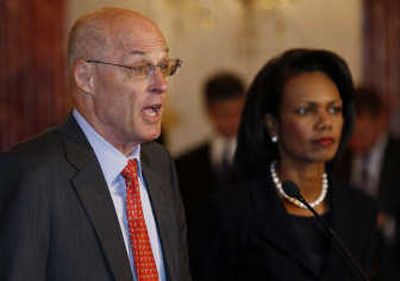Bush goes solo on Iran sanctions

WASHINGTON – For more than two years, the United States has insisted that the key to stopping Iran’s suspected nuclear weapons program is maintaining unified international pressure on the Islamic Republic.
But on Thursday, the Bush administration signaled in no uncertain terms that it’s prepared to go its own way in confronting what it considers to be a growing threat from Iran, even if doing so demolishes an increasingly shaky global consensus.
The administration unilaterally imposed the toughest set of sanctions on Iran since the country’s Islamic revolution in 1979.
The measures target the Islamic Revolutionary Guard Corps, the military vanguard of Iran’s Islamic state; the IRGC’s paramilitary arm, the Quds Force; Iran’s largest state-owned bank and two others; and 17 companies and individuals that are part of the IRGC.
The sanctions are intended to cut off Iran’s access to the U.S. financial system and discourage private businesses from operating in the country.
President Bush’s action drew immediate criticism from his own party.
“Unilateral sanctions rarely ever work,” Sen. Chuck Hagel, R-Neb., a foreign policy moderate, said during his weekly news conference. “I just don’t think the unilateral approach and giving war speeches helps the situation. It will just drive the Iranians closer together.”
It also “escalates the danger of a military confrontation,” he said.
Secretary of State Condoleezza Rice and Undersecretary of State R. Nicholas Burns insisted Thursday that the sanctions weren’t a prelude to military action against Iran.
Even so, the administration’s actions immediately rekindled fears among Democrats and other countries that the administration is on a path toward war. Bush’s charged rhetoric in recent months, including a warning that Iran could trigger a “nuclear holocaust,” and his close consultations with hard-liners on the issue – such as former Commentary editor Norman Podhoretz – have led many outside the White House to conclude that he will order airstrikes to eliminate any Iranian nuclear capability.
“The choice of words has given rise to concerns about just how serious the president is about stopping Iran from crossing the nuclear threshold on his watch,” said Suzanne Maloney, an Iran expert who left the State Department earlier this year.
Sen. Robert Byrd, D-W.Va., said in a statement Thursday that Bush’s action “not only echoes the chest-pounding rhetoric which preceded the invasion of Iraq in 2002, but also raises the specter of an intensified effort to make the case for an invasion of Iran.”
West European governments didn’t immediately react to the sanctions. But Russian President Vladimir Putin warned scathingly that new sanctions could worsen relations with Iran and bring talks to “a dead end.”
“It’s not the best way to resolve the situation by running around like a madman with a razor blade in his hand,” he said during a visit to Portugal.
The broad sanctions, senior U.S. officials said, are meant to target not only Iran’s nuclear program, but also what Washington asserts is its support for anti-U.S. forces in Iraq and Afghanistan, export of ballistic missiles and support for international terrorism.
Matthew Levitt, an expert on terrorist financing and a former Treasury Department official, said the measures are “the largest single sanction action that I know of. … This is huge.”
Others said that while the sanctions are likely to deepen Iran’s isolation, other countries with deep business ties to Iran, such as China and Russia, are unlikely to follow suit.
The sanctions end what bankers call “U-turn” transactions – using third parties to settle oil contracts in the United States – which allowed Iran to conduct business in dollars despite previous sanctions.
But Iran had prepared for the U.S. decision by moving most of its oil business into euros and yen, the currencies of the European Union and Japan. “It’s not like it came without warning,” said Hal Eren, a Washington attorney who specializes in legal issues involving economic sanctions.
The unilateral U.S. move, under consideration for several months, appears to be an acknowledgement that U.S.-led efforts to contain Iran via the United Nations Security Council have faltered.
Last month, in the face of resistance from Russia, China and Germany, Rice agreed to postpone consideration of new U.N. sanctions until next month, pending talks between Iran and the International Atomic Energy Agency.
“We haven’t seen the kind of action from many countries around the world who trade with Iran. China, for instance, has increased its trade with Iran,” Burns said. “And since we believe in diplomacy and want to make it work, we have to find another way to make diplomacy work and that is through these strengthened sanctions.”